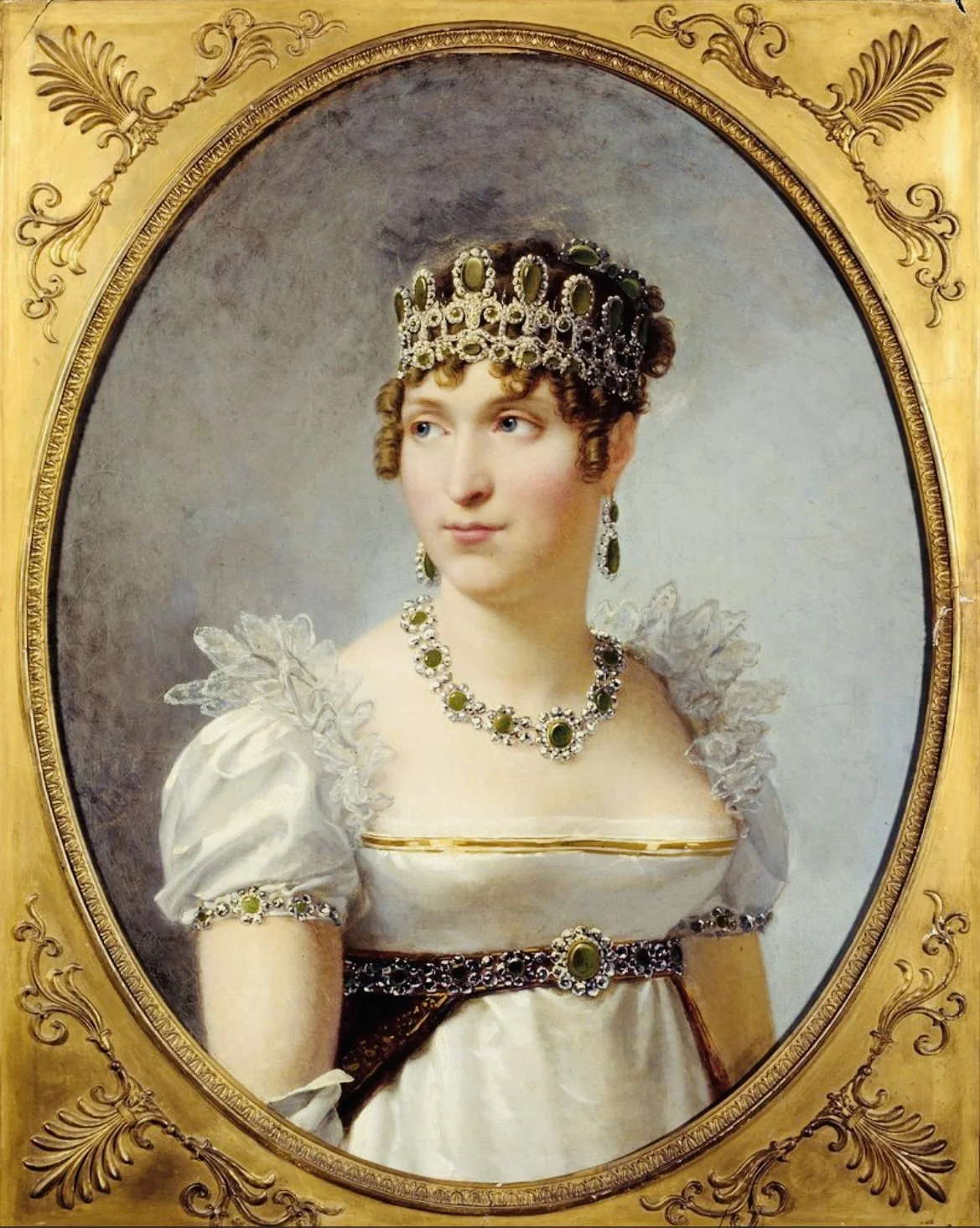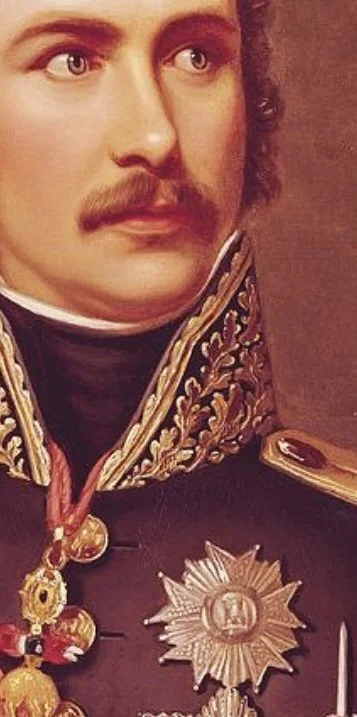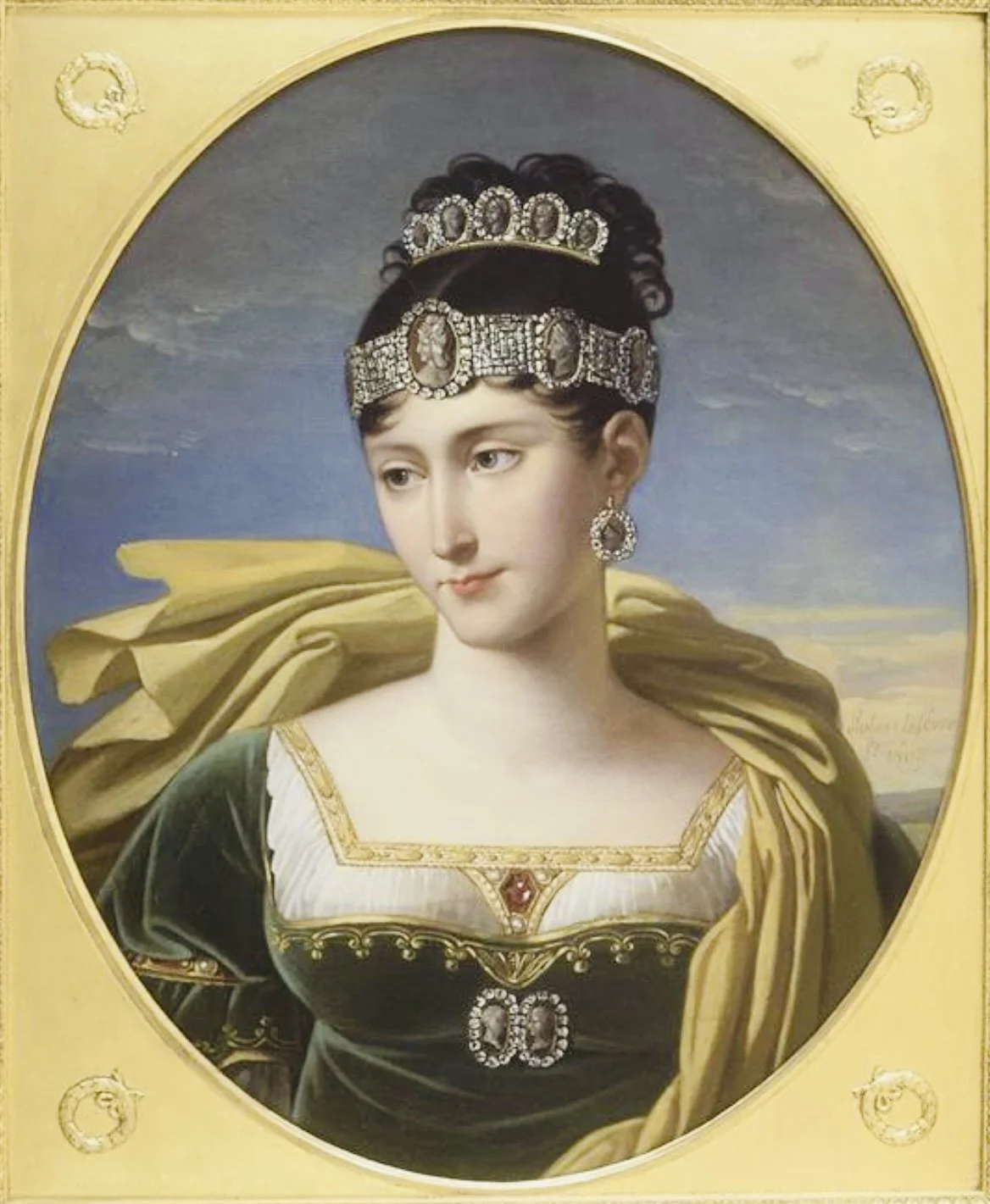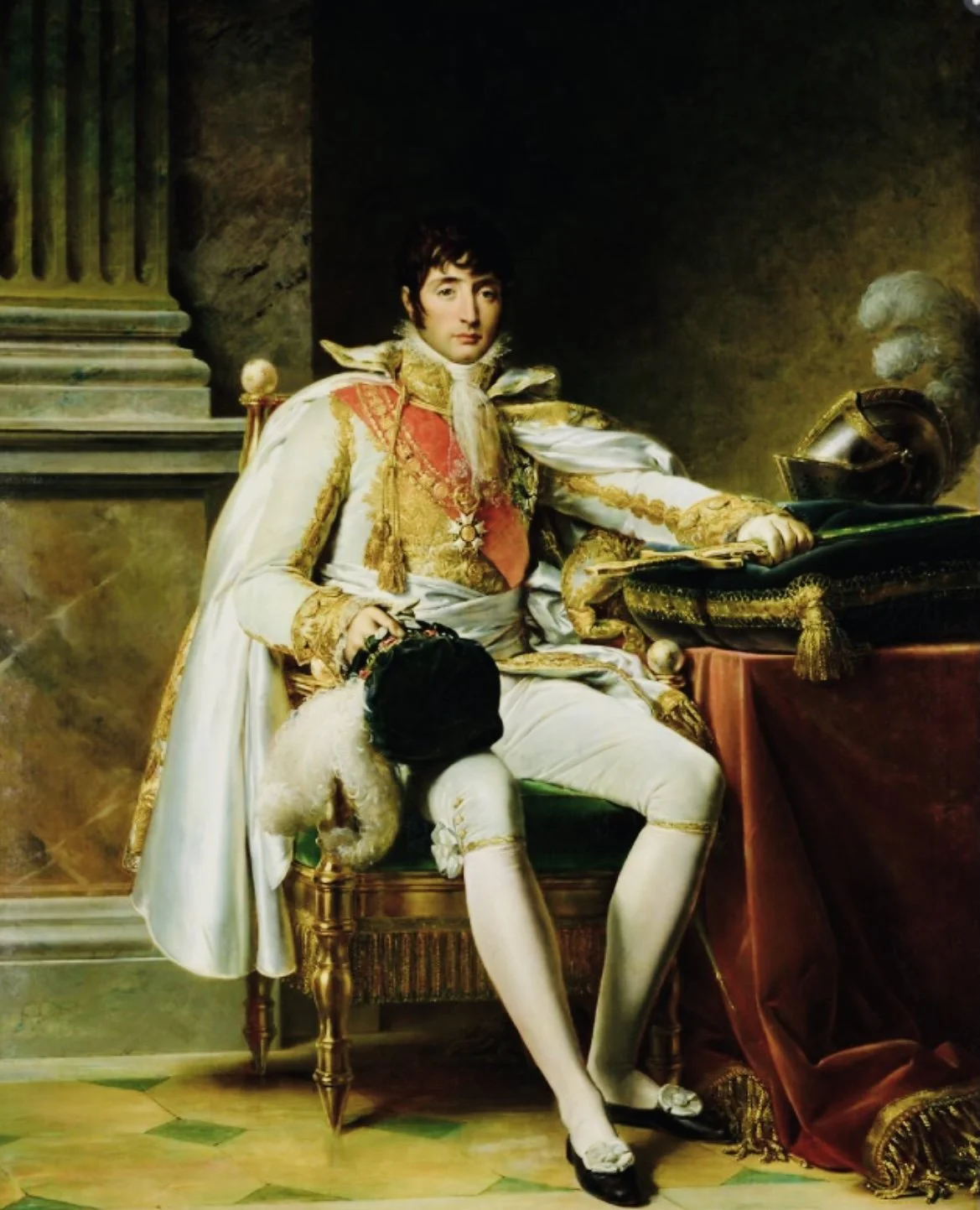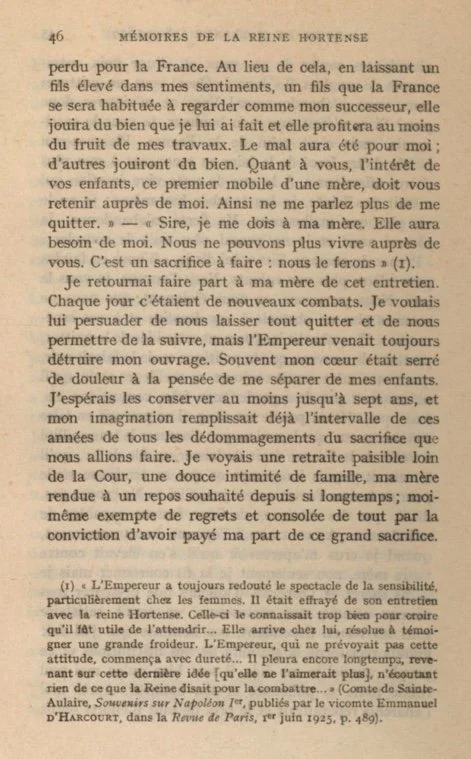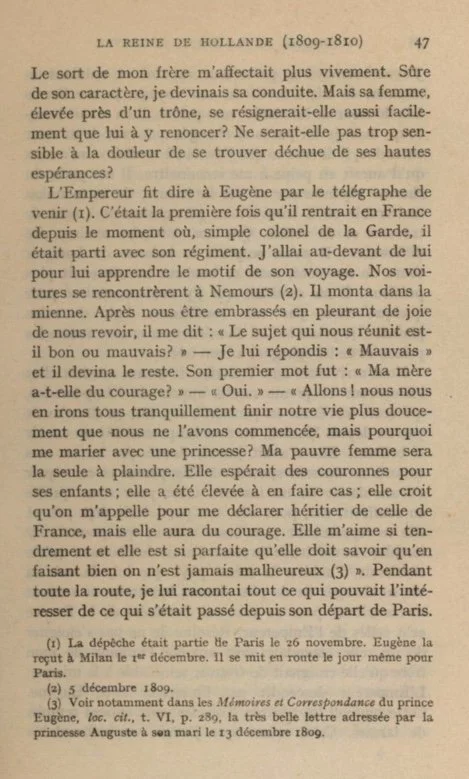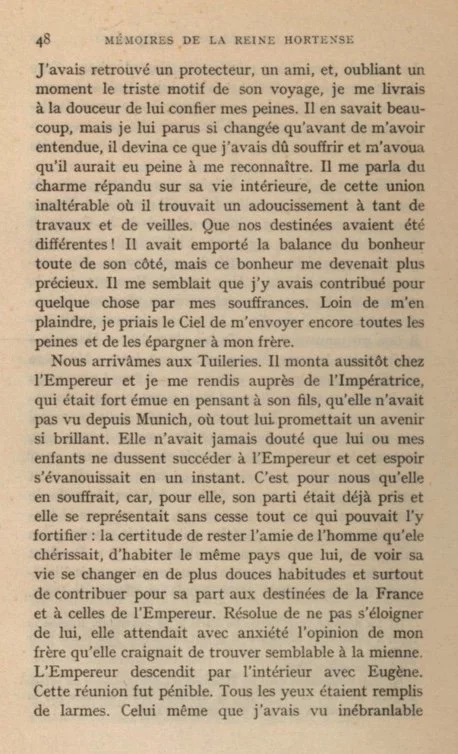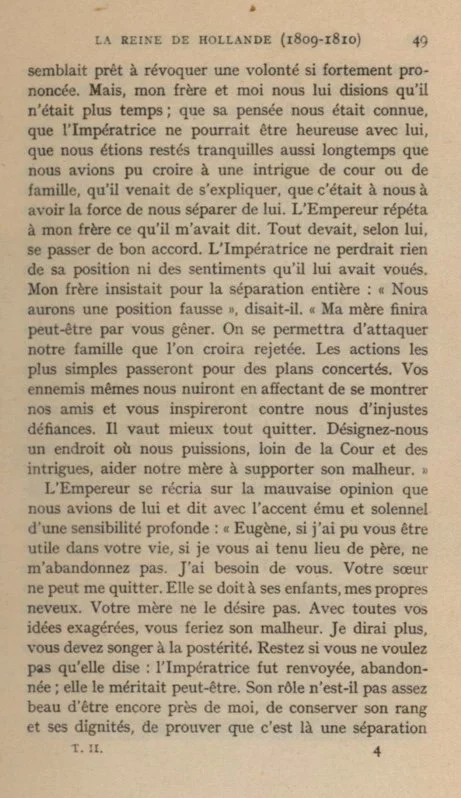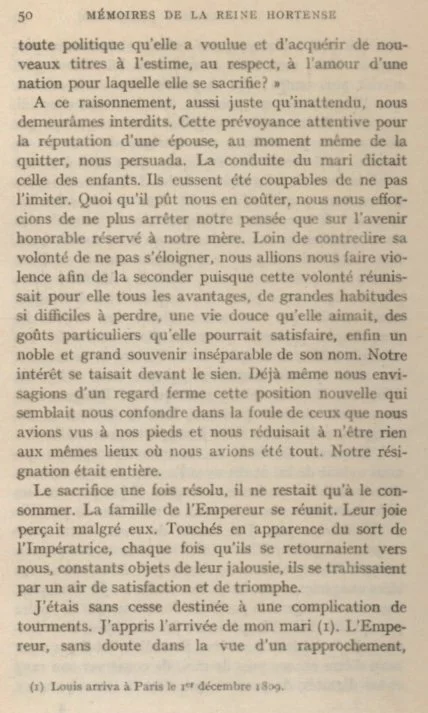Let’s have another look at Hortense’s Memoirs. If you want to read the book it is available for free at the side bar in English and French. Use the widget on the sidebar to translate the text below into pretty much any language.
The years of hidden hand machinations bring on the destruction of Napoleon’s family and below we see the bizarre scene play out where Napoleon’s stepchildren demand to be released from his milieu and Napoleon will absolutely not permit it.
Hortense’s memoirs continues:
I returned to report to my mother the conversation that had taken place. Every day brought new conflicts. I persuaded her to let us leave everything behind and follow her, but the Emperor afterwards undid all my work. Frequently my heart bled at the thought of leaving my children. I had hoped to be allowed to keep them with me until they were at least seven years old, and my imagination already pictured all the compensations for my sacrifice which the intervening years might contain.
I dreamed of a possible refuge far from the court, the humble pleasures of a family life which would afford my mother the rest she had long desired. There at least I should be able to console myself.
Freedom from all anxiety would be my compensation for the sacrifice we had made. I was less clear about my brother's future. Knowing his character, I could guess what his own conduct would be. But would his wife, brought up as she had been close to a throne, agree to renounce her position as willingly? Would she not feel too keenly the loss of those high hopes which she had held for the future?
The Emperor sent Eugene word by [optical] telegraph to come to Paris. It was the first time he had been back to France since the day when as a colonel of the Guard he left it at the head of his regiment.
I went to meet him, to inform him of the reason for his trip. Our carriages met at Nemours [December 5, 1809]. He left his carriage and came over to sit in mine.
After we had embraced each other, weeping with joy as we did so, he said to me, "Is the reason for my return pleasant or unpleasant?"
I answered, "Unpleasant." And he guessed the rest. His first words were "Has my mother courage to face it?"
“Yes."
“Very well. We shall all leave quietly and end our days more simply than we began them. But why did they make me marry a princess? My poor wife is the only one to be pitied. She has hoped that her children would wear crowns. She has been brought up to consider that important. She thinks I have been sent for to be named heir to the throne of France.
But she will be brave. She loves me so dearly and she is so fine that she must know that if you do right you can never be unhappy."
While we were traveling back together, I told him everything about what had happened in Paris which I thought might be of interest to him. I had once more found a protector, a friend, and forgetting for a moment the unpleasant cause of his presence I gave myself the joy of unbosoming myself of all my troubles.
He knew a good deal already, but when he found me so altered in appearance, he guessed the rest, and realized the intensity of my sufferings. He admitted to me that he would have had difficulty in recognizing me.
Eugene told me of the charm that enveloped his own home-life, of that perpetual atmosphere of harmony which was a refuge for him after all his labors.
How different our fates had been! All good fortune seemed to have been allotted to him, yet his good fortune became all the dearer to me, for I felt that in a way my own suffering had to some degree made it possible. Far from complaining of what had befallen me I prayed Heaven to continue to send me all the misfortunes of life and to spare my brother.
We arrived at the Tuileries. Eugene immediately went up to see the Emperor, and I returned to the Empress. The latter was deeply moved at the thought of meeting her son again, whom she had not seen since they had met at Munich.
She had never doubted that either he or my children would succeed the Emperor, and all these hopes had suddenly vanished. She grieved solely on our account for, as far as she was concerned, her mind was already made up.
She kept constantly before her those ideas that strengthened her decision: she would remain the friend of the man she loved ; she would continue to live in the same country that he did; her own existence would be simpler; above all, the knowledge that she was doing her share to insure the happiness of France and of the Emperor.
She was determined not to live far away from him, and she waited anxiously to know my brother's opinion on this point, which she feared might be the same as mine.
The Emperor and Eugene joined us, coming down by the private stairway. Our meeting was a painful one. All eyes overflowed with tears. Even the man who when I had seen him was absolutely decided seemed ready to change the resolutions he had formed. But my brother and I assured him the time for that was past. Now that we knew what was in his mind the Empress could no longer be happy with him. We had not taken any action so long as we considered the matter merely a court intrigue or a family cabal, but now that he had explained all to us we felt obliged to leave him.
The Emperor repeated to my brother what he had already said to me. He wished everything to take place amicably. The Empress should not lose either her position or the respect he had for her. My brother insisted that the separation be a complete one.
“Otherwise we might find ourselves in an ambiguous position," he said. "In the end my mother might prove to be in your way. People would dare attack our family, thinking we had been dismissed from court. Our simplest actions would be considered prearranged plans. Even your enemies would hurt our cause by passing themselves off as our defenders, and lead you to suspect us unjustly. It is better to leave nothing behind. Tell us a spot where, far from the court and its intrigues, we can help our mother bear the weight of her misfortune."
The Emperor protested against the poor opinion we seemed to have of him and said, speaking in a serious thoughtful way that showed he was deeply moved "Eugene, if ever I have been useful to you in your career, if you have looked upon me as a father, do not abandon me. I need you. Your sister cannot leave me either. She owes that to her children, who are my nephews. Nor does your mother wish you both to go away. With all your exaggerated ideas you will increase her unhappiness. Indeed, I may say more—you should remember the verdict that history will pass on your mother. You must remain with me unless you wish it to be said: 'The Empress was repudiated, abandoned, and perhaps deserved such treatment.' Is not her attitude a far nobler one if she continues to live near me, to keep her rank and her position, to prove by doing so that our separation was due entirely to political necessities and one to which she consented? She will thereby deserve more than ever the praise, love and respect of the nation for whose good she sacrificed herself."
We did not know how to reply to these new arguments, as powerful as they were unexpected. We were won over by the Emperor's solicitude for his wife's reputation at the very moment he was leaving her.
The attitude of the children toward their mother had to be the same as that of the husband toward his wife.
They would have done wrong not to follow his example. Instead of seeking to oppose the Emperor's wish that we stay at court we were prepared to agree to it, since by doing so we assured our mother so many advantages, a quiet life such as she liked, an opportunity to satisfy her own tastes, and a noble and worthy memory in the minds of all.
Our desires were subordinated to her interests. Already we prepared to accept our new position, which placed us on an equal footing with the crowd that had before been at our feet and made us nobodies still living on amid the same surroundings where they had formerly been all-powerful.
Once the sacrifice had been resolved upon, the only thing left was to carry it out. The Emperor's family met to hear what had been decided. Their joy was apparent in spite of their efforts to conceal it. Although pretending to be touched by what was happening to the Empress, every time they turned to us, of whom they had always been jealous, they betrayed their true feelings by their satisfied and triumphant manner.
It seemed I was always to be obliged to face several troubles simultaneously. Now I heard that my husband had come back.
The original French is available below:

